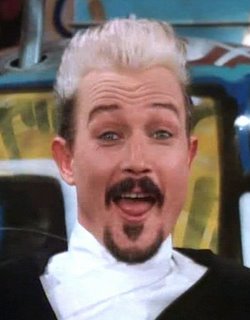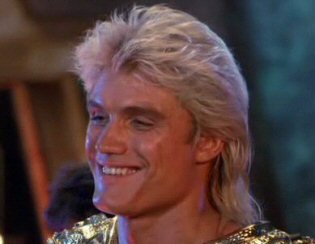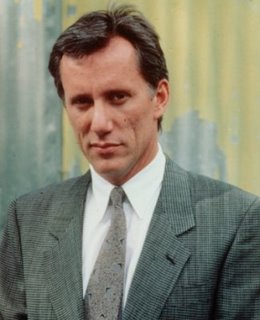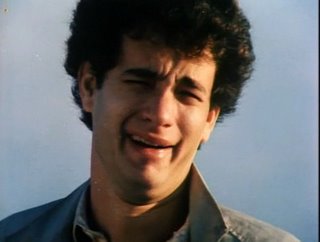Double Dragon

You are in a dark and cavernous room. You are standing immobile; the only feeling is of sand nuzzling sensuously into the recesses of your bare toes. A painting of the grinning clichés of Egyptian mythology graces every grain. You look up and see the ceiling, tessellated with the eroded logos of Capcom and Namco. A pernicious wind swoops over your head, leaving behind the aural residue of pseudo-kung-fu. You glance forward and notice outcroppings ahead, tumours afflicting the room’s sidewalls. A quick sniff of the miasma being emitted from the darkness to your rear and you move forward.
A few tentative steps and a vision of horror arrives from the wayside, a tumultuous greeting card signed by a phantasma hiding in the shadows. It is an apparition of a beret-wearing Van Damme, limbs and sneers akimbo in an almighty and seemingly inviting pose. But the reassuring and vivacious imagery is soon disseminated by the materialisation of a demonic film critic, before any invitation can be answered. The haggard-faced critic wastes no time compressing the fighting stance of Van Damme into a shrink-wrapped salute to its own pretentious omniscience. It then casts the plastic-asphyxiated doleful of invisible boats and posthumous dedications into the void beyond.
You block out the dreadful execution and move forward another few paces. Here another vision. This time the stumpy legs of Bob Hoskins blur into the reptilian features of Blue Velvet, all set against a backdrop of plumbery fungi with welcoming hand-signals. The festivity is sliced short by another vengeful film critic, this time brandishing a portrait of Ebert’s egregiousness. Emotionless and relentless, the critic wastes few seconds in his annihilation of the merry state that once was.
With the nightmarish vapour causing you to wretch, you bend over and begin to cough up chunks of sputum. While doing this you hear an interlude of midi-beeps and arthritic thumbs. Looking up you see a glow in the darkness ahead. Standing, you briskly motion nearer to it. Once in its fallout zone, another vision smacks you in the jaw. This time it’s of a martial artistic dyad, the wallpaper of combat lining its extremities. A waving face, anonymous yet familiar, ushers you towards a swirling vortex, whilst out of the sharp angles of your eye smokes up another vile film critic. Before musing deliberations into a death of more circumlocutions, you take a leap into the maelstrom.
You awaken to the whispery invocations of the Double Dragon movie. It sits opposite you, legs crossed like a parody of a rutted sitcom actor playing a cub-scout in a made-for-TV Disney movie. You dish out a verbal application form, something that goes a little like this, “Who the fuck are you?” Smirk spawning on its somewhat face, it tells you to relax and listen. It takes a breath of the O2 and vociferates, “I am the Double Dragon movie. You may call me Double Dragon The Movie for short. And I am going to tell you a yarn long and tedious about my life….”
In order to save wear and tear on the double-inverted-comma key, and avoid libellous asides, here will be a paraphrasing of that yarn.
Double Dragon, based on the video game of the same appellation, was released in 1994, a year that also saw boisterous releases from the two archetypes of excessive conversation. Such are their names written in every stone and shingle, a direct citation need not be gifted, suffice it to snidely remark, “your man with the chin and that guy with the Star Wars references.”
The film’s synopsis ambles the soil of convention. Two brothers, both adept at stretching inner leg musculature, attempt to keep one half of a special talisman away from Robert Patrick, who possesses the other half. When these two parts are united together, absolute power is granted to the uniter.
That sub-Brandon Lee (how’s that for an insult), Mark Dacascos, plays Jimmy Lee, the mature component of this brotherly twosome. Billy Lee, the younger and more juvenile one, is played by the offspring of some obscene mutual rape between Michael J. Fox, Tom Cruise and Eric Stoltz; a creature who goes by the name of Scott Wolf. Both showcase their primitive set of blows and wallops, taking the requisite break for a wisecrack or two. As if made from manufactured rubber, including holding the substantiality of said substance, the double lizards bounce around with much fervour.
Brawls and one-liners are set within the near-future dystopia of New Angeles, a 1997 post-earthquake variant of the Californian metropolis. Like all good dystopic macrocosms, this one comes with roaming gangs, caricatures of news broadcasts, and a curfewed night-time unpoliced by law enforcement. Amongst this is a grouping of altruistic insurrectionists intend on pulling the city back into civility, led by Alyssa Milano before she became a witch, but after she let John Matrix stick his tongue in her ice-cream.
The film is shimmied along by the presence of one Robert Patrick, just out of a career typecasting turn as the oozy villain in another film that looked with distant eyes towards 1997. He plays the sorcerous Kogo Shuko, whose hair is almost as stupid as his name. He possesses a number of interesting powers, including the ability to float around two-dimensionally; just watch in awe as he flutters about like a Paganini caprice. His pathetic duelling skills tower contemptuously over any of the witticisms the heroic brothers serve up; he is able to backhand scornfully with revelations such as he killed their father. Oh what evil, his ‘tache twitches with every renegade deed.
The only elements in here that can possibly compete with Patrick are a short cameo by that great hairless legend Michael Berryman, and a gang-honcho who is transformed into a reject from The Story of Ricky, a heaving, strapping mould-of-plastic monster.
Other than that we’re incarcerated in Direville here, a place full of roads that snake into horrendous video game digressions, and with boulevards laced with boat chases on a slick of oil. Why the brothers seem to live in a theatre is unknown to me, I can and will only assume they were trying to recreate Artaud’s Theatre of Cruelty.
Amongst the occasional moments of hilarity, where I thought my internal organs were going to be vomited out my mouth in a fit of guffaw, there were numerous moments of appalling unpleasantness, where I thought my internal organs were going to exit out my mouth and go and watch something better, like Stalker. The game-to-film malady knifes another victim, a double stab to both plot and characters, and its convulsing self lies helplessly on the carpet south of my DVD player. But whereas Street Fighter received a funeral with all the works, and Super Mario Bros got a nice, low-key cremation, Double Dragon is left simply to bleed-out and decompose alone, it has merited nothing more.







